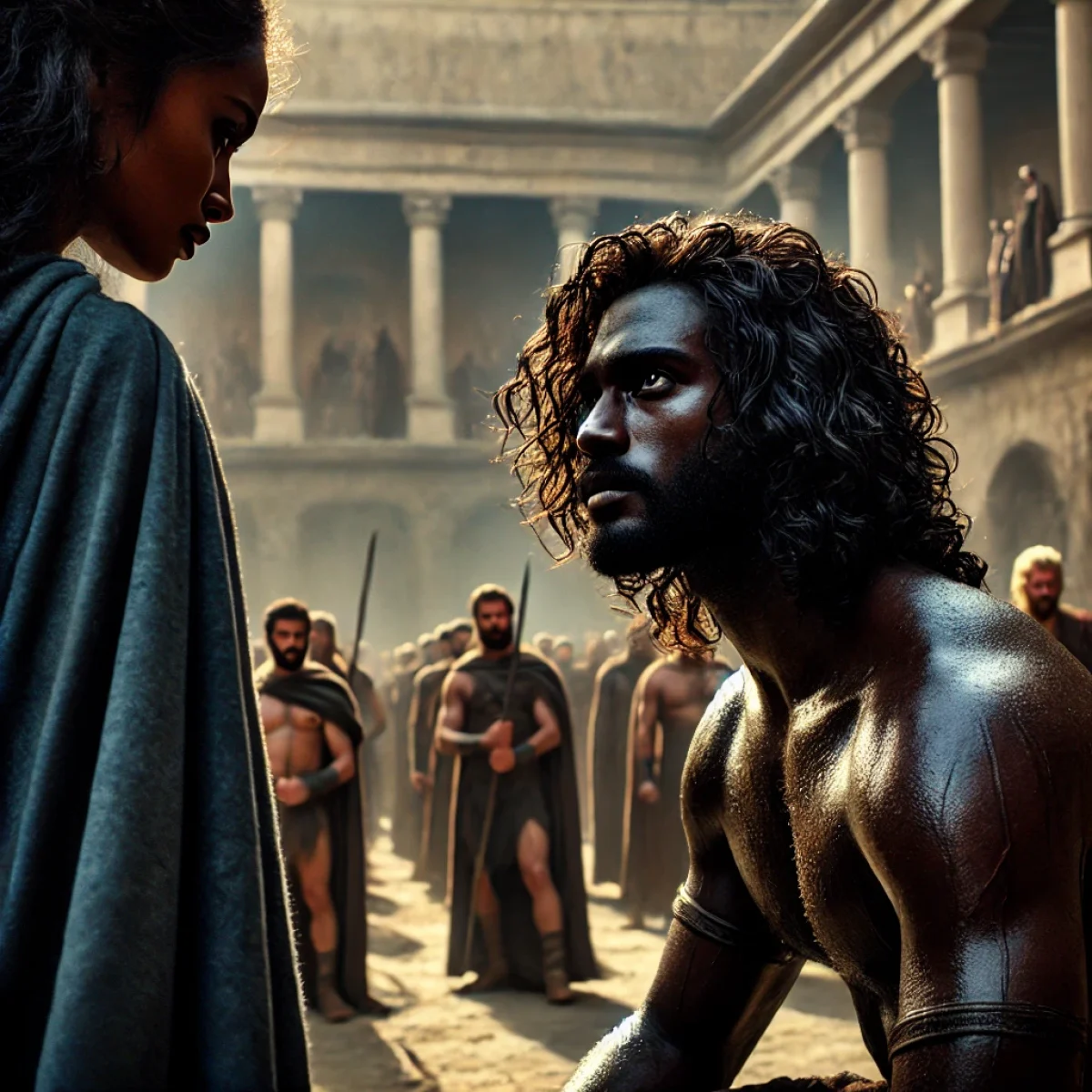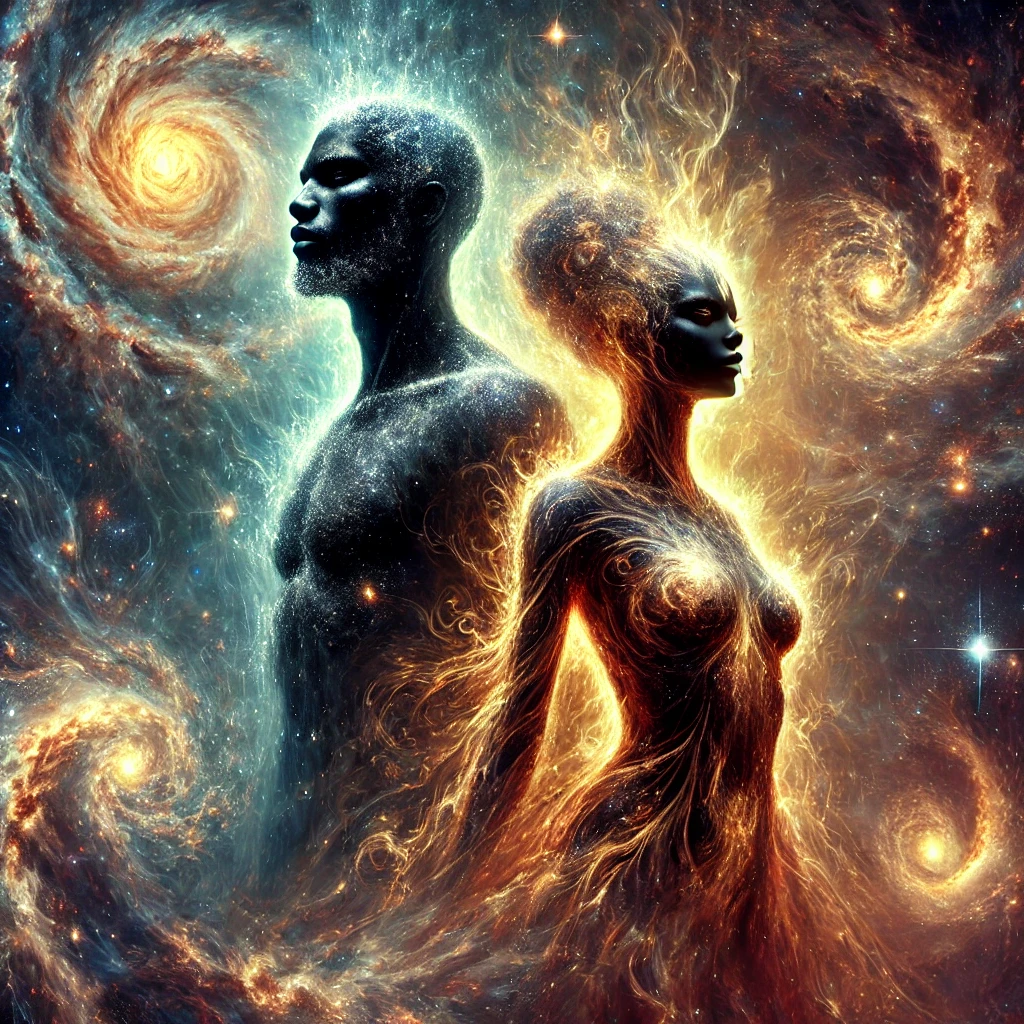Part I: The Awakening
Chapter 1: Chronos’ Creation
In the silent womb of the Void, where time had not yet stirred and desire lay dormant, a god was born. His name was Chronos, and he was no ordinary keeper of moments—he was the architect of both time and passion, a weaver of fate and longing alike.
The Voidborn, those primordial spirits that lurked between the boundaries of existence, beheld him with reverence. To them, he was the pulse of the cosmos, the rhythm that shaped eternity’s breath. From the first instant of his being, they adored him—not as mortals worship in fear, but as kindred creatures drawn to his undeniable power.
Chronos was no cold and distant deity, for in his hands, time did not merely move; it sighed, ached, trembled. His presence bent the wills of gods and mortals alike, but it was not by force—his was a seduction woven into the fabric of creation itself.
For he was the god of time, and time waits for no one.
And he was the god of desire, and desire yields to nothing.
Wherever his presence touched, longing followed. Women of all species—goddesses, mortals, spirits of the wind and sea—felt the pull of him. Not as mindless slaves, but as beings awakened, ignited, freed. He was not their master, nor they his prisoners. Instead, they were drawn into his orbit willingly, lost in the gravity of his existence.
They did not resist, for what is resistance against the force of time?
And so, the story of Chronos began—not as a tyrant who conquered hearts, but as a force that awakened them.
Chapter 2: Becoming Dr. Pascal Beverly Randolph
Time is not linear. It bends, folds, stretches into impossible loops.
And so Chronos, god of time, did not simply watch history—he became it.
There was a man in the 19th century, a free Black mystic, a scholar, a traveler of both the physical and metaphysical realms. A man whose words, when spoken, sparked revolutions of thought. His name was Dr. Pascal Beverly Randolph, and through him, Chronos walked among mortals.
In this mortal guise, Chronos did not wield his power with arrogance, nor did he lord his gifts over those he encountered. Instead, he whispered dreams into the minds of poets, breathed fire into the hearts of women who had been told they could not shape the world. He seduced not for conquest, but for creation, for in the arms of passion, new ideas are born.
In the salons of Paris, in the hidden circles of mystics, in the secret chambers of lovers—he was there.
And those who met him, who felt his touch in their minds and bodies alike, became something greater.
He did not seek to own them, nor did they seek to be owned. Instead, they wove themselves into his existence as freely as the stars find their place in the night sky.
For Chronos was not a jailer. He was a door.
Chapter 3: The Hourglass of Time
Yet for all his power, even Chronos could not always remain. Time, by its nature, is fleeting.
And so, he crafted an hourglass, a relic of impossible craftsmanship. It was no mere measure of sand and gravity, but a living thing—its grains composed of moments themselves, each speck a fragment of eternity.
With it, he could slip between the layers of history, stepping through the thresholds of past, present, and what-could-have-been.
With it, he could reach across the barriers of time and space, meeting the souls that called to him before they were ever born, and long after they had ceased to be.
And so, with each turn of the hourglass, the god of time moved forward and backward alike, ever-seeking, ever-discovering.
And in the wake of his passage, he left echoes of love and longing, carved into the fabric of history itself.
Chapter 4: Temples of Lust
There are many ways to worship.
Some kneel before silent gods, waiting for mercy that never comes. Others whisper prayers into the wind, hoping they are heard.
But those who followed Chronos did not beg—they lived.
He did not demand temples of stone or golden idols in his likeness. Instead, the temples that bore his name were woven of silk and laughter, filled with the scent of burning candles and the sound of voices rising—not in supplication, but in joy.
Here, women of every kind—mortal, divine, and all in between—found sanctuary, not in servitude, but in liberation. They were not vessels, nor mere objects of pleasure; they were creators, unchained from the bonds of time and expectation.
And Chronos, their god, did not rule them. He set them free.
Chapter 5: Chronos’ Lovers
They were not rivals, these women who loved him.
For how could one be jealous of the moon, knowing the sun will rise for them again?
Each bore a piece of him within them, and in return, they gave him their loyalty—not out of submission, but out of something purer. Recognition.
For Chronos did not seek to take. He sought to give.
And in giving, he became eternal in their eyes.
Chapter 6: No Enemies
Where there is love, there is no war.
Among his followers, there was no envy, no bitterness, no need to claim what had already been freely shared. He was not a prize to be won, nor a throne to be fought over.
He was the river, and they were the ocean.
Chapter 7: Chronos’ Reflections
But power does not exist without consequence.
And in the still moments, Chronos wondered.
Had he changed the world for the better? Had his influence freed, or had it bound?
Were the women he touched truly liberated, or had they merely exchanged one god for another?
The hourglass turned, and the question remained unanswered.
Chapter 8: The Web of Devotion
But even as doubt whispered, his lovers did not waver.
They had become something greater than worshipers. They had become each other.
Bound by love, by purpose, by the shared fire that he had lit within them, they did not stand as separate figures, but as a web of devotion—woven across time, across space, unbreakable.
And together, they became a force even Chronos himself could not have foreseen.
Chapter 9: The Crisis of Time
But time is not without flaw.
A fracture in the hourglass. A tear in the fabric of eternity.
The cosmos trembled, and Chronos was faced with a choice.
To save time itself, he would have to undo something precious.
And in that moment, even the god of time felt the weight of regret.
Chapter 10: Chronos’ Legacy
In the end, Chronos made his sacrifice.
He restored the balance of time, but in doing so, left behind more than temples, more than memories.
He left a legacy.
In the hearts of those he touched, in the souls he had awakened, in the freedom he had given—his name would never fade.
For Chronos was never meant to be merely worshiped.
He was meant to be remembered.

